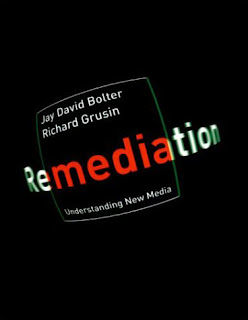This being by far the most current of our readings, having been written not only in a time when I was alive, bu
 t also cognizant of and actually using the technology described in the book as it was being written, I was a little surprised to not know or understand a lot of the references. The movie Strange Days and the music video, Telecommunications Breakdown were used ad-nausium throughout the book, but I have never heard of either of them. And I'll be honest, I had NO idea what a MUD was, and the context clues were about as clear as mud. Multiuser Dungeon? Really? So, it's basically World of Warcraft meets chat room. (Do they even have chat rooms anymore?) Well, I guess as much as things change they stay the same. So, after discovering that this book was a weird kind of time capsule, I decided to look past the dated material and look at the content.
t also cognizant of and actually using the technology described in the book as it was being written, I was a little surprised to not know or understand a lot of the references. The movie Strange Days and the music video, Telecommunications Breakdown were used ad-nausium throughout the book, but I have never heard of either of them. And I'll be honest, I had NO idea what a MUD was, and the context clues were about as clear as mud. Multiuser Dungeon? Really? So, it's basically World of Warcraft meets chat room. (Do they even have chat rooms anymore?) Well, I guess as much as things change they stay the same. So, after discovering that this book was a weird kind of time capsule, I decided to look past the dated material and look at the content.Bolter and Grusen argue that media continues to grow upon itself as it evolves from one medium to another. It takes part of that old medium and "remediates" it, or uses the old thing in a new way, to show how the new technology improved on the old. One way in which they contend media tries to improve on itself is the ever present, ever unattainable quest for immediacy, or reality to be captured and experienced through media. For example, a photograph is a more realistic version of a painting, and a movie (short for "moving picture") is a more realistic version of a picture, and a "talkie" is a more realistic version of a movie, and so on. Each medium builds upon the last to fulfill the previous medium's broken promises of realism. This is reminiscent of McLuhan's rear view mirror theory, in which we can only understand our current media in terms of past media. Bolter and Grusen take it one step further in contending that new media IS old media, with a face lift (which, by the way, they contend is a remediation of the self).
They also contend that media is both trying to be immediate (feel so real that it disappears) and hypermediate (to constantly remind the viewer or hearer of itself). One of my favorite types of media is the theme park, and not just any theme park, Walt Disney World! Walking down Main Street USA, one is submerged in the sights and sounds of Disney's "make believe" world. In this sense the theme park is very much immediate, it reaches every one of your senses and brings you in to its fantasy. Even the lines bring you into the story of a Mission to Mars or a journey back to time. However, a quick trip inside for some air will jolt the vacationer back to reality as he is bombarded with food and souvenirs for sale, at quite a hefty price tag. Or, when walking from one "land" to another, the park guest hears a change in music, costume, and architecture and is again reminded of the media surrounding him. The whole park is full of remediation everywhere one looks. At the end of every ride is a gift shop with souvenirs for that ride. Chances are that the ride was based on a Disney movie, which was probably based on a book. The park itself is a remeidation of Disneyland, which was remediation of the TV show Disneyland, which then again, was a remediation of the theme park Disneyland. Disney doesn't call it remediation though, they call it Synergy.
This back and forth remediation is also seen in television and the web, mostly by TV stations that now have websites. In a world where information is free and immediate, channels like CNN use their website to not only send viewers back to the TV station, but a
 lso use the TV station to send viewers back to the website. Both mediums are full of hypermediated material with multiple boxes of scrolling information and pictures, each is a veritable wealth of information and stimulation. I believe CNBC is the station responsible for the "octobox" and the "decabox" showing 8 or even 10 "live" people at once talking with each other about the day's news. Although it is in some ways immediate, because the people are "live" and talking to each other in real time, it is also extremely hypermediated with not only the sheer quantity of talking heads, but also the graphics and music along with them, one can not help but remember that she is watching TV.
lso use the TV station to send viewers back to the website. Both mediums are full of hypermediated material with multiple boxes of scrolling information and pictures, each is a veritable wealth of information and stimulation. I believe CNBC is the station responsible for the "octobox" and the "decabox" showing 8 or even 10 "live" people at once talking with each other about the day's news. Although it is in some ways immediate, because the people are "live" and talking to each other in real time, it is also extremely hypermediated with not only the sheer quantity of talking heads, but also the graphics and music along with them, one can not help but remember that she is watching TV.Although technology (especially the web) has moved forward by leaps and bounds in the last ten years since Remediation was written, its examples can still be seen in the new (and let's face it, remediated) generations of technology available today.
Hahaha I love your reaction to the book. I felt the same way when I was reading it, and baffled by MUD multiuser dungeon--especially when they were talking about mediated sex. Huh?
ReplyDeleteI think it's interesting that you linked to an image of a woman getting a facelift. Gary's blog sums it up that the driving force behind remediation is more about increased self expression and social connectedness vs. the immediacy of virtual reality. From that standpoint, the symbolism of the facelift is right on. (Well, that is if we believe erasing the signs of aging is more self-expressive.)
If it makes you feel any better, I've now read this book twice and I have yet to see Strange Days or Telecommunications Breakdown. I guess I should take the time, but everything else - work, school, family -always seems to get in the way.
ReplyDeleteWhat I find amusing about TV news is that while they claim to be "immediate," they're almost always reporting/discussing/hashing out news that has already taken place. Occasionally (mainly when someone is embedded in a war zone or on election night) the events are transpiring as they're being discussed, but it's usually at least an hour after the fact. The time is spent fact-checking and lining up appropriate guests, so I don't fault them for that, but it does seem disingenous to say you're "immediate" when you're not. It's kind of like the idea that reporters must be completely objective.
I liked your Disney example. Prior to reading this book, I never would have considered what Disney or other marketers do as "remediation." It just seemed to be a clever marketing ploy to get you to spend as much money as possible with the latest "it" franchise. It's interesting how this concept of remediation, or more specifically, hypermediation seems to be very prevelant in our culture today.
ReplyDeleteI had the same fuzzy brained feeling. That tends to happen when I read theory, but there were several words that I swear I didn't know were words (and still don't think they are), which didn't help the situation at all. I think that some forms of media, especially news channels are doing everything they think they can to grab the viewers' attention and bring you the latest and greatest in their format, however, this turns into complete sensory overload and an inundation of TOO MUCH INFORMATION. Someone told me recently that you can't really multi-task, because you're not giving your full attention to *anything*. That's what tends to happen when I'm reading the scroll at the bottom of the screen, listening to and watching the broadcaster, and looking at the visuals/photographs of the story. Then comes the on-the-spot reporter with his take on it, his real time interviews, the witnesses to the tragedy, the expert's opinions. ENOUGH ALREADY!! Sometimes I miss the simplicity of not having to hear 40 different people's take on some racist idiot trying to keep a bunch of kids out of a community pool. It's not a national tragedy, CNN. Don't even get me started on the amount of overload that that causes...
ReplyDeleteI had the same problem as the rest of y'all in the sense there was too much information. I did find however this professor (Stephen Dobson,(http://bit.ly/XXsrf) who did point out somethings and i agree with him. The book contains way too much information and doesn't narrow. There could be more covered on some of the topics instead of reaching along every topic to get the point across.
ReplyDeleteI however did get one more thing out of being hypermediated. That is we don't just see it in the Web and just in the TV it seems to float across more. We're now in our mobile devices in our MP3 players (now with the iPod Nano having a camera) and various other interactions through out the day we are seeing windows in what we'd never normally have seen before. We are processing more information that we've ever had to before.